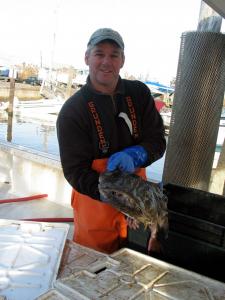Bill Tunney

Long Island Traditions
Folklorist Nancy Solomon has documented the maritime culture of Long Island through these interviews spanning the years 1987 – 2016. The collection includes baymen, fishermen, boat builders and other maritime tradition bearers.
National Capital Contracting
On November 28, 2007, Nancy Solomon conducted an interview with Bill Tunney as part of the Long Island Traditions Oral History Collection. Tunney is a commercial fisherman based in East Patchogue, New York. He grew up in Bellport Village and started clamming on Great South Bay when he bought his first boat at the age of thirteen. Over the years, Tunney began to work out on the ocean and has expanded his fishing activities to include gillnetting as well as dredging for crabs and scallops. Tunney briefly left the region for college, during which he earned a degree in mechanical engineering. However, he eventually decided to return and make a career of fishing. He speaks to some of the challenges he faced as a newcomer to the profession, including having to earn the respect of more established fishermen. He also discusses what a typical day of work entails and the different kinds of fish he targets during each season. Tunney explains how he shifted to spending more time on the ocean as the bay became less lucrative. Learning to make effective nets proved to be one of the hardest parts of the job, and Tunney offers a breakdown of how webbing size and color can affect one’s catch. He also details the parts and process of setting gillnets. The conversation also covers Tunney’s clientele, the federal regulations that have impacted local fishermen, the annual costs of gear, and the number of other commercial fishermen operating in the area.
Please Note: The oral histories in this collection are protected by copyright and have been created for educational, research and personal use as described by the Fair Use Doctrine in the U.S. Copyright law. Please reach out Voices@noaa.gov to let us know how these interviews are being used in your research, project, exhibit, etc. The Voices staff can help provide other useful resources related to your inquiry.
The NOAA mission is to understand and predict changes in climate, weather, oceans, and coasts, to share that knowledge and information with others, and to conserve and manage coastal and marine ecosystems and resources. The Voices Oral History Archives offers public access to a wide range of accounts, including historical materials that are products of their particular times, and may contain offensive language or negative stereotypes.
Voices Oral History Archives does not verify the accuracy of materials submitted to us. The opinions expressed in the interviews are those of the interviewee only. The interviews here have been made available to the public only after the interviewer has confirmed that they have obtained consent.
